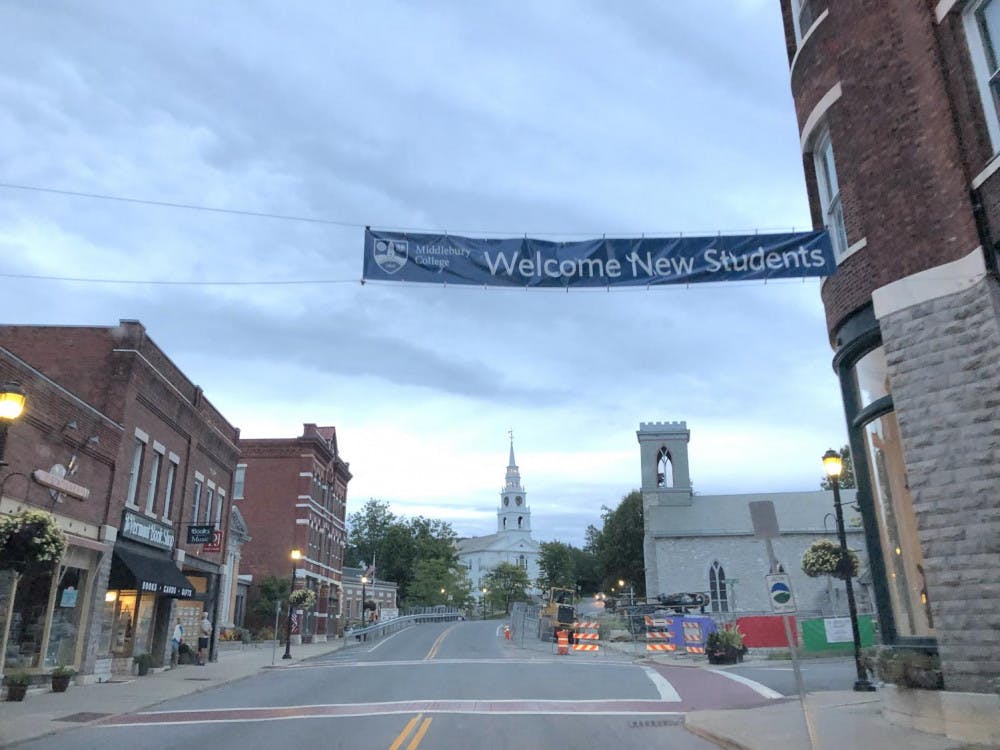Several local business owners reported seeing whom they suspected were college students wandering town and attempting to patronize their shops as Middlebury College welcomed its first crop of students back to campus on Aug. 18. Such actions are in direct violation of Middlebury’s pre-arrival quarantine orders that require students to travel directly to campus and remain there until the college moves into the second phase of its opening plan. While some business owners took to social media to remind students to follow the college’s orders, unconfirmed rumors of students drinking at a Vergennes bar, visiting the Natural Foods Co-op and purchasing coffee in town circulated Twitter from a professor’s account that has since been deleted.
Pierre Vachon, owner of Frog Alley Tattoo and Leatherworks, turned away roughly a dozen people identifying themselves as Middlebury students seeking piercings at his shop on Aug. 17. Chiyo Sato, the manager of Otter Creek Bakery, reported seeing an influx of customers within the last week. She suspects many were college students and their families returning to campus. The Campus spoke to almost 20 business owners and staff members, nearly all of whom had heard similar reports and were worried about interacting with students throughout the semester.
The first group of students arrived at Middlebury for testing on Aug. 18 after signing a health pledge stating that they would complete a 14-day at-home quarantine and take the most direct route to the college to avoid infection or infecting others en route. Students were instructed to remain in their rooms while they waited for their test results and were released to campus quarantine on Aug. 19 or 20 provided their tests came back negative.
Vachon worries that, should Middlebury students continue showing up at his shop requesting services, he may be forced to close for the next month to protect the community. The move would cost him thousands of dollars in lost revenue. He fears local customers will simply choose to patronize his competitors who are not forced to close, crippling his business in the long term. He has only now just begun to get back on his feet after having closed in March under the state-mandated lockdown and then slowly reopening in June following state guidelines and safety protocols.
“I think that's important for students to understand. . . if I get shut down . . . I lose my entire income,” Vachon said. “It's not the same as you just go[ing] back home and go[ing] back to school by remote learning.”
Vachon, like many other business owners and residents, worries that the actions of a small pocket of the Middlebury student population will cause an outbreak and undermine months of hard work and sacrifice by the local community to bring the numbers down. According to the CDC, Vermont currently has only 244 cases per 100,000 residents, making it the most successful state nationwide in controlling Covid-19 transmission. There are currently no active student or employee cases at the college.
“[I’m] nervous and scared for my community. I worry about those like my neighbor’s grandmother who lives with the server who works at Two Brothers or works at the restaurant and the people that are immunocompromised,” Vachon said.
Senator Ruth Hardy, who represents Addison County in the Vermont Senate, shared similar concerns in a letter to President Patton on Aug. 12 urging her to drastically scale back the college’s reopening plan, which Hardy says risks the health and safety of her constituents and puts the possibility of any in-person K-12 education in jeopardy.
Throughout the summer, many of the senator’s constituents have contacted her expressing their concerns about Middlebury’s reopening and the possibility of a local outbreak. She says that while the college did consult with the town’s Select Board in forming its fall semester plans, the decision was made without input from other Addison County leaders, contributing to a sense of powerlessness among her constituents and amplifying town-gown tension.
“Even in regular times, [there is] tension between Middlebury College and the broader community. Add on top of that a pandemic, and it becomes magnified,” Hardy said. “You’ve made all these sacrifices in order to keep our community healthy: You haven’t seen your family. You haven’t gone on vacation. You haven’t gone to your job. And then this big institution says, ‘Well, we’re going to bring 2,300 students back.’ I think that people feel like this is a further way that they’ve lost control of their community and lives.”
Hardy was careful to direct her comments toward the administration and their policies rather than the students themselves, whom she believes have been set up to fail by strict rules and regulations they won’t be able to follow.
All of the business owners who spoke to the Campus emphasized their overwhelmingly positive view toward students, who form a large share of their clientele. The incidents of students violating quarantine are the exception rather than the rule, Vachon said. Most of his shop’s patrons come from the college, and he loves having the school as part of his community. Unfortunately, the most visible students at this time are those violating the guidelines, as compliant students remain on campus.
“The story that has gotten lost in recent conversations is that approximately 280 students have already arrived, received their first Covid-19 test, fully observed their room quarantine, received negative test results and been released to campus quarantine without incident,” Dean of Students Derek Doucet said. “By definition, those students were essentially invisible after they left the test center because they were doing exactly what we asked of them.”
The college asks that those who believe they have witnessed students violating Middlebury’s Covid-19 health protocol report the details to the college through an online form. The Department of Public Safety and the Office of Community Standards will investigate those reports, and the Office of Community Standards will decide the validity of claims and sanction students if necessary. The college promises to be transparent with the outcome of investigations, though the personal information of students and reporters will remain confidential.
While most of the students who called Vachon or went to Frog Alley Tattoo for piercing appointments were happy to comply with his requests to schedule appointments for later in September — when the college plans to move into phase two — others allegedly became aggressive.
Vachon described facing a group of four people who identified themselves as Middlebury students, all unmasked, that showed up at his shop while he was piercing another client. After refusing to see them that day and requesting that they schedule appointments after they completed their full testing and quarantine, one group member started yelling at him.
The group member reportedly called him racist and accused him of discriminating against her and her friends. Vachon — feeling threatened not only by her intense reaction but by the health risk of facing four unmasked students, whom he worried were from out of state— told the Campus he retreated into his shop and faced the group from behind his glass door. Vachon reported the incident to Public Safety, but the college determined that there was “insufficient information to pursue that case further,” according to Doucet.
Public Safety determined that they had enough information to investigate five of the incidents reported last week. Two claims, including Vachon’s, had “insufficient information to investigate further.” Two others were originally reported to the Middlebury Police Department and “determined to be unfounded” by the college after discussing the incidents with the police. The college determined that one claim constituted a minor violation of the health protocols and resulted in a sanction against a student, according to Doucet.
After posting a video on Facebook describing his interactions with college students over the last few days, Vachon reportedly received an outpouring of support and effusive apologies from Middlebury students on behalf of their classmates.
“[I want students to] understand that you fit and you have a place in [the Middlebury] community. You may be an odd and separate piece at times, but you're a part of the community,” said Vachon. “But you also have a responsibility to take care of your community. . . Your community needs you to step up.”

Sophia McDermott-Hughes ’23.5 (they/them) is an editor at large.
They previously served as a news editor and senior news writer.
McDermott-Hughes is a joint Arabic and anthropology and Arabic major.
Over the summer, they worked as a general assignment reporter at Morocco World News, the main English-language paper in Morocco.
In the summer of 2021 they reported for statewide digital newspaper VTDigger, focusing on issues relating to migrant workers and immigration.
In 2018 and 2019, McDermott-Hughes worked as a reporter on the Since Parkland Project, a partnership with the Trace and the Miami Herald, which chronicled the lives of the more than 1,200 children killed by gun violence in the United States in the year since the Marjory Stoneman Douglas High School shooting in Florida.




